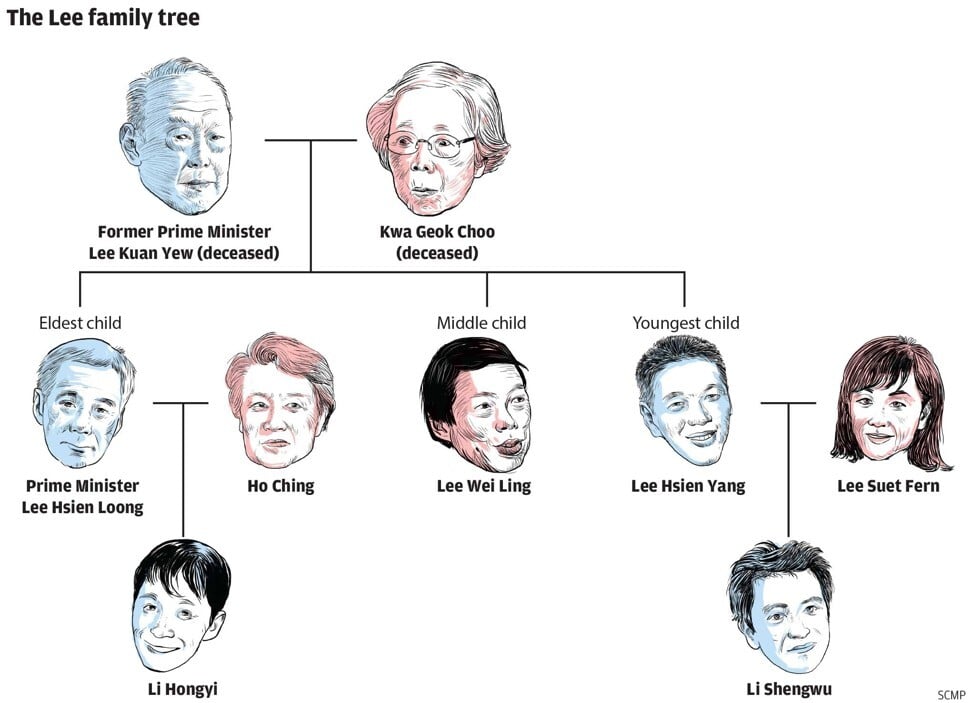
Lee family feud: Singapore court suspends Lee Suet Fern over misconduct in handling Lee Kuan Yew’s will
- Lawyer Lee Suet Fern, the daughter-in-law of Singapore independence leader Lee Kuan Yew, was involved in preparing his final will
- The judges said a substantial period of suspension was merited as the ‘harm’ caused by the top corporate lawyer was at ‘the lower end of the moderate range’
The ruling by the Court of Three Judges, led by Chief Justice Sundaresh Menon, is final and cannot be further appealed. The case was referred to the judges in February after a disciplinary panel found the corporate lawyer guilty of improper conduct in directly handling the final version of the elder statesman’s will.
The allegations against Lee Suet Fern were brought by the country’s Law Society, which alleged that the lawyer managed every aspect of the will’s drafting, and failed to advise Lee Kuan Yew to seek legal counsel from a third party to avoid a conflict of interest – given that her husband was a beneficiary of the will.
The final will in which Lee Suet Fern was involved was the seventh prepared by Lee Kuan Yew – a Cambridge-trained lawyer who served 31 years as Singapore’s prime minister – between the death of his wife Kwa Geok Choo in 2010 and his own death at age 91 in March 2015.
In a written judgment seen by This Week in Asia, the judges said they found that “no solicitor-client relationship existed” between Lee Kuan Yew and his daughter-in-law.
Still, the “material harm” caused by Lee Suet Fern‘s involvement was that Lee Kuan Yew “ended up signing a document which was in fact not that which he had indicated he wished to sign”, the judgment said.
The judges accepted that Lee Kuan Yew had previously changed his will several times and was content with it after the last version was signed. He lived for more than a year after executing the last will, and did not revisit it apart from providing for the bequest of two carpets to Lee Hsien Yang.
But “the fact that the Last Will and the First Will were materially similar was fortuitous, and does not discount the fact that the potential harm could have been far more severe than the actual harm that eventuated”, the judgment said.
The court nonetheless held that striking Lee Suet Fern off the rolls – the penalty sought by the Law Society – would be “disproportionate”. It said the penalty needed to reflect “both her culpability and the harm caused by her misconduct”.
Lee Suet Fern maintains Lee Kuan Yew was never her client, and that she had instead been instructed by him as his daughter-in-law.
Lee Kuan Yew knew what he wanted. He got what he wanted
In a statement, Lee Suet Fern said she disagreed with the court’s decision and there was “no basis for this case to have ever been initiated”.
“Lee Kuan Yew knew what he wanted. He got what he wanted,” Lee Suet Fern said, referring to the final contents of the will.
“Anyone can revoke their own will while they are alive. If this will was not what Lee Kuan Yew wanted, he could easily have made another, as he had done several times before,” she added.
Her son Li Shengwu, a Harvard University economics professor, in an immediate response to the judgment, wrote on Facebook that his uncle had “no shame about using state resources to settle grudges against relatives”.
“[Prime Minister Lee] should resign now, rather than continuing to undermine the rule of law in Singapore,” Li said.
He made the comments in connection with the family feud.
Lee Hsien Yang also took to Facebook, sharing his wife’s statement on the judgment.
He wrote: “My wife is a highly regarded international corporate lawyer from Singapore with an unblemished career record. Over the years, she has received numerous international awards for her professional work.”

The court’s decision comes nearly three-and-a-half years after a public feud erupted among Lee Kuan Yew’s three children.
In June 2017, the two younger siblings Lee Hsien Yang and Lee Wei Ling kicked off the saga, now widely referred to as the Lee family feud, by accusing their brother – Prime Minister Lee – of abusing his executive powers to scuttle their efforts to demolish the family bungalow, as their father had wanted.
Lee Kuan Yew had previously said in public that he detested the way the homes of national figures such as India’s founding prime minister Jawaharlal Nehru were left in “shambles” after they were converted into tourist attractions.
Prime Minister Lee later went before parliament to dispel the allegations and offer assurances that he had recused himself from the government’s decision-making process on the issue.
He also said the government would not change the status quo of the house – which is owned by Lee Hsien Yang and occupied by sister Lee Wei Ling – as long as Lee Wei Ling continued to live there.
Officials tasked into looking into the matter in 2018 said outright demolition, a complete preservation of the home as a national monument, and a partial preservation of the basement dining room – the site of historic meetings – were the three options a future government could consider when the time came to decide the fate of the property.



